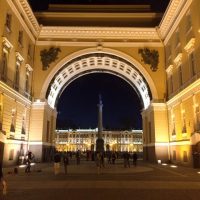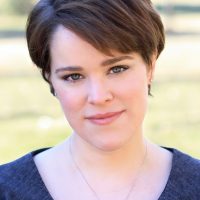 A review of Music History Professor Angela Mace Christian’s work recently appeared in Music and Letters, a top journal in musical scholarship. The reviewer, Marcia Citron, is widely regarded as a foundational scholar in Fanny Hensel studies and, more broadly, women in music. The following is an excerpt from the journal regarding the *contribution by Angela Mace Christian (and the collection of essays as a whole):
A review of Music History Professor Angela Mace Christian’s work recently appeared in Music and Letters, a top journal in musical scholarship. The reviewer, Marcia Citron, is widely regarded as a foundational scholar in Fanny Hensel studies and, more broadly, women in music. The following is an excerpt from the journal regarding the *contribution by Angela Mace Christian (and the collection of essays as a whole):
In "'Der Jüngling und Das Mädchen’: Fanny Hensel, Felix Mendelssohn and the Zwölf Lieder, Op. 9," Angela Mace Christian offers a brilliant inquiry into the relationships embodied in the jointly authored lieder collection that bears Felix’s name in print. Christian knows their music well: she provides perceptive analysis and alternative readings, and explores the impact of revisions on the manuscript. The discussions effectively incorporate feminist interpretation and consider Douglass Seaton’s view that the set may constitute a Liederspiel. Christian’s contribution represents scholarship at its best: thorough, imaginative, beautifully written and structured.
This rich collection assembled by Aisling Kenny and Susan Wollenberg is a "must-have" for those interested in the history of lieder, the musical practices of women, and the social landscape of the nineteenth century.
~ Marcia Citron, review of Women and the Nineteenth-Century Lied, ed. Aisling Kenny and Susan Wollenberg, Music and Letters 97/2 (2016): 344-47. Click here for Citron’s full review.
*Angela Mace Christian, “‘Der Jüngling und Das Mädchen’: Fanny Hensel, Felix Mendelssohn, and the Zwölf Lieder, op. 9,” in Women and the Nineteenth-Century Lied, ed. Aisling Kenny and Susan Wollenberg, 63-84 (Aldershot: Ashgate, 2015).
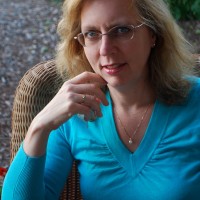 Music History Professor K. Dawn Grapes has been selected by Sponsored Programs as Colorado State University’s 2016 nominee for a National Endowment for the Humanities Summer Stipend. According to the grant website, “Summer Stipends support individuals pursuing advanced research that is of value to humanities scholars, general audiences, or both, and supports continuous full-time work on a humanities project for a period of two consecutive months.” As primary coordinating office for externally-funded activities, Sponsored Programs at CSU serves and assists faculty toward their goal of outstanding research and scholarly activities. If selected by the NEH, Dr. Grapes plans on using the award for research at Harvard University on Dwight’s Journal of Music, an influential 19th century periodical.
Music History Professor K. Dawn Grapes has been selected by Sponsored Programs as Colorado State University’s 2016 nominee for a National Endowment for the Humanities Summer Stipend. According to the grant website, “Summer Stipends support individuals pursuing advanced research that is of value to humanities scholars, general audiences, or both, and supports continuous full-time work on a humanities project for a period of two consecutive months.” As primary coordinating office for externally-funded activities, Sponsored Programs at CSU serves and assists faculty toward their goal of outstanding research and scholarly activities. If selected by the NEH, Dr. Grapes plans on using the award for research at Harvard University on Dwight’s Journal of Music, an influential 19th century periodical.
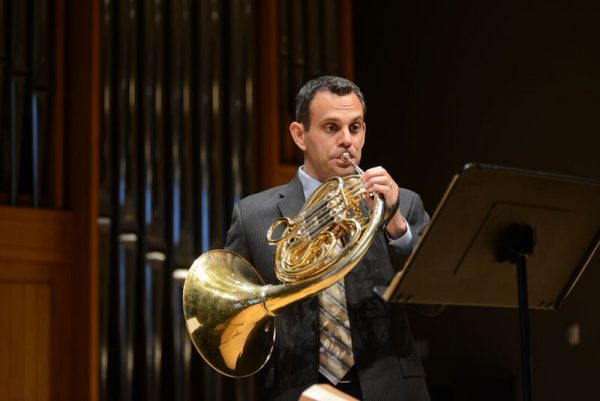 This Sept., Horn Professor John McGuire returned to St. Petersburg, Russia with Fortress Brass to perform at the Brass Autumn Music Festival. The following are excerpts from his trip blog:
This Sept., Horn Professor John McGuire returned to St. Petersburg, Russia with Fortress Brass to perform at the Brass Autumn Music Festival. The following are excerpts from his trip blog:
As enjoyable as a tour is, I always feel the hardest part is the initial journey to your destination. We flew for 24 hours, had two connections, and had to eat airline food for multiple meals. And the hardest part is that after all of this, we had to get off the plane and go directly into a rehearsal with an orchestra. My piece, the Concerto in E-flat by Christoph Forster, is hard enough when you’re well rested, but after a long travel day…oy! That’s when you have to rely on your preparation and trust your training!
[The first] concert involved each of the five of us playing solos with the orchestra and then playing several brass quintets for a packed hall. Having been over here before, we learned that with as much as the Russian audiences appreciate good classical tunes, they really are into jazz music, especially Dixieland, which happens to be a staple of our repertoire. They clapped along with several of our tunes and demanded encores! It was so invigorating to feel such appreciation for what we do! Afterwards, we signed a lot of autographs, took lots of pictures, and visited for a long time. Music really is transcendent!
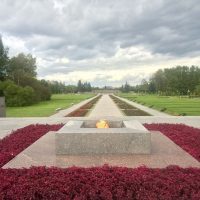 On a day off for the group, we went to the Piskaryovkoye Memorial Cemetary where almost half a million Russian civilians and soldiers are buried in mass graves. These people died of starvation and the extreme cold during the German blockade of St. Petersburg during WWII. I’ve had the opportunity to go to many WWII sites around Europe and it’s never easy. I always have such reverence and appreciation for what occurred. The beaches of Normandy, Dachau concentration camp, and now this, among many others. You feel the residual weight of history. It’s overwhelming on a deeply emotional level, reducing you to tears. It really makes you realize just how important what we do is, how much more we have in common when seen through the lens of the arts…
On a day off for the group, we went to the Piskaryovkoye Memorial Cemetary where almost half a million Russian civilians and soldiers are buried in mass graves. These people died of starvation and the extreme cold during the German blockade of St. Petersburg during WWII. I’ve had the opportunity to go to many WWII sites around Europe and it’s never easy. I always have such reverence and appreciation for what occurred. The beaches of Normandy, Dachau concentration camp, and now this, among many others. You feel the residual weight of history. It’s overwhelming on a deeply emotional level, reducing you to tears. It really makes you realize just how important what we do is, how much more we have in common when seen through the lens of the arts…
The Russian audiences are genuinely some of the warmest and most appreciative in the entire world…whether it’s the audiences, Russian musicians, or Russian music teachers and students, they have always been so kind and eager to hear our playing, our styles, and our teaching approaches. I encourage everyone to see for themselves, if you ever can have the chance!
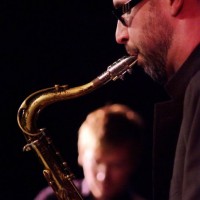 In June, Jazz Professor Peter Sommer joined the Artist Roster at D'Addario Woodwinds. “D'Addario reeds make it possible for me to focus on making great music, rather than going on a great and lengthy quest for a reed suitable for performance. I really love their consistency and warmth, and in particular, I haven't found anything else that even comes close to helping me achieve my ideal jazz tenor sound.” Having used D’Addario reeds since 1997, Sommer is excited about this opportunity!
In June, Jazz Professor Peter Sommer joined the Artist Roster at D'Addario Woodwinds. “D'Addario reeds make it possible for me to focus on making great music, rather than going on a great and lengthy quest for a reed suitable for performance. I really love their consistency and warmth, and in particular, I haven't found anything else that even comes close to helping me achieve my ideal jazz tenor sound.” Having used D’Addario reeds since 1997, Sommer is excited about this opportunity!


